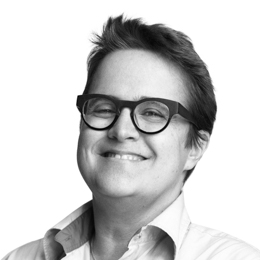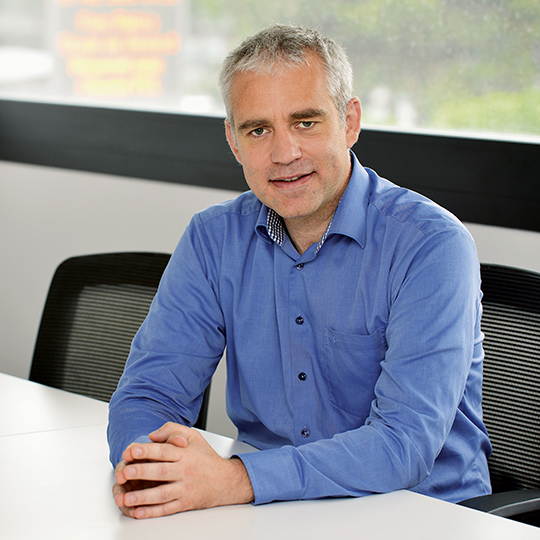What does your technology consist of?
Hervé Affagard: Everyone now knows that the microbiota - in other words a person's gut flora - plays a central role in ensuring that our bodies work properly, particularly our immune defence mechanisms. However, certain major medical treatments - such as chemotherapy, antibiotics and stem-cell transplants - are very aggressive and have a destructive impact on the hundreds of species of bacteria that make up our microbiota. This is particularly the case for patients suffering from blood cancer. Our technology consists of designing medicines (capsules and enemas) based on the microbiotas of selected healthy donors to restore the intestinal flora that has been damaged by those treatments.
Are you working on a particular indication?
H.A.: Our most advanced development concerns graft versus host disease. Every year, this disease affects 20,000 leukemia patients who have received a stem-cell transplant, which is the only treatment for certain types of leukemia. In 25% of cases, the transplanted cells attack the tissue of the person receiving the transplant. Corticosteroids can be ineffective as a treatment, and in those cases, the mortality rate can reach 80%. So we are addressing a medical need that is currently not being met. Reconstructing these patients' microbiotas could help them to overcome the disease, because it increases tolerability at the intestinal level.
What are the stages involved in developing a technology like this?
H.A.: It all started in 2013. I was concerned about digestive issues because of my family history and I started working on the microbiota with Dr Joël Doré, head of research at INRA (the French National Institute for Agricultural Research) and professor Mohamad Mohty, oncologist at the Hôpital Saint-Antoine in Paris. I worked for a year to prepare the initial development plan, holding discussions with regulatory agencies and meetings with R&D partners, before setting up MaaT Pharma in December 2014. We carried out trials on humans between September 2016 and May 2017. That enabled us to establish our proof of concept based on 25 leukemia patients. We then monitored patients to show that the treatment was safe over a 1-year period. We now know that we can reconstruct 90% of the microbiota in 90% of patients. We are now starting phase II clinical trials to treat graft versus host disease which is the most serious side-effect experienced by leukemia patients treated using stem-cell transplants. We are aiming to obtain a marketing authorisation in 2021.
How is your research funded?
H.A.: We carried out an initial €2 million fundraising round in December 2014 for the animal development phase, then a €10 million funding round in 2016 for the human trials. Today, we are actively looking for investors to finance new clinical trials. In the medium term, we would ideally become part of a large pharmaceutical group that has the resources and network to market our product.
It's worth noting that, alongside the USA, France is one of the most advanced countries in this area, in terms of research centres, the regulatory environment but also funding, with investors who are very familiar with the issues involved.
Is that the case with Crédit Mutuel Innovation?
H.A.: Yes. We have been in contact since the company was created, although the deal did not take place until we carried out the 2016 funding round. We chose Crédit Mutuel Innovation (formerly CM-CIC Innovation) because they can "think disruptive" and take an interest in new approaches to medical practice, such as those taking the view that microbes can have potential benefits. As well as their financial expertise, their networking capability has been particularly useful. For example, my partners at Crédit Mutuel Innovation have put me in touch with a Harvard professor who is a world-leading expert in our sector.
Crédit Mutuel Innovation is also a member of our strategy committee, and we are developing our business approach together.
What the partner says

The microbiota is a scientifically complex area that is now very fashionable following extensive media coverage.
The competitive landscape, in a fast-growing market whose profile has risen enormously, offers a wide range of solutions.
MaaT's starting point is based on the fundamental relationship between the microbiota and the host, and therefore the importance for hosts to maintain the balance of their microbiotas. This was very interesting to us, since it seemed both disruptive and scientifically solid.
MaaT has now proved its ability to restore balance to a microbiota that has been damaged by major medical treatments. The team is taking a genuinely industrial approach, following a series of very precise and standardised stages, leading to a treatment that is safer and easier to use for a large number of patients.
We were impressed by this industrial, structured approach, and also by MaaT's team of people with complementary leading-edge skills.
There is still a lot of work to do, particularly to influence the perception that patients may have about these solutions, but initial clinical results are impressive and we are very proud to be able to accompany MaaT on this adventure.
25% is the overall 5-year survival rate for patients with acute myeloid leukemia
€750m initial target market
First European platform meeting "good manufacturing practice" standards for medicines based on the intestinal microbiota




